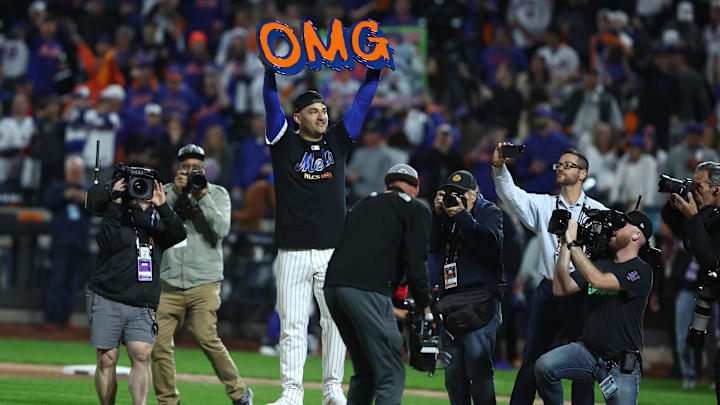The Minnesota Twins jumped late into the major league free-agent market to cap what had been a stagnant offseason amid the club's pending ownership change.
In the week before players began reporting to spring training, the Twins added slugger Ty France, outfielder Harrison Bader and left-hander Danny Coulombe.
Their roster still could use some shoring up, notably a backup shortstop for Carlos Correa.
Is a shortstop the next target for Derek Falvey and the Twins front office? Let's examine the pros and cons of the Twins signing a free-agent shortstop.
PRO:
Multiple (possibly) decent shortstops remain on the market. The best might be José Iglesias, who for years got elite defensive results at short for the Detroit Tigers and others. While his career production at the plate falls about 10 percent below major league average, he has shown the occasional ability to get oddly hot.
In 2024, after playing entirely in Triple-A the season before, Iglesias batted .337/.381/.448 with four home runs and 16 doubles in 291 plate appearances for the Mets. It added up to 3.1 bWAR, the best season of his 12-year career.
Further, he was a key part of the team's positive vibes — notably fueling the "OMG" meme by performing a bilingual pop song that also served as a Mets rallying cry. If you can play solid defense, slug .448, and carry a tune, you've had a big season.
Citing roster construction reasons (and also implying he wanted too much money), the Mets decided to move on from Iglesias for 2025.
CON:
The Mets didn't need Iglesias much at shortstop with Francisco Lindor playing 152 games there. Iglesias played only 18 innings at short — not really any kind of sample to judge his metrics — but he does in the bigger picture appear to be slipping on defense.
At 35 years old, he still put up positive stats at third base and solid numbers at second, but exactly what he has left at short is a bit mysterious.
PRO:
Iglesias isn't the only free-agent fish.
Paul DeJong started his career great, finishing second in NL Rookie of the Year voting in 2017, and making the All-Star team in 2019 with the St. Louis Cardinals. From his rookie season through 2023,
DeJong also was credited with 40 Total Runs Saved on defense, per Fielding Bible, ranking sixth among shortstops in that span — better than Lindor and Dansby Swanson.
In 2024, he also hit .228/.275/.430 with 18 home runs in 363 plate appearances for the White Sox, and added six more home runs with the Royals down the stretch. His overall output was about 5.0 percent below league average.
CON:
DeJong's defensive results also dropped significantly in 2024. At minus-9 Total Runs Saved at short, he moved into the Willi Castro neighborhood.
DeJong is 31 years old, so he's likely closer to the end than the beginning.
Was the drop an anomaly? The tip of the iceberg? Something we can just blame on the White Sox?
Can "anomaly" also describe the uptick in his offense? Around the time of DeJong's All-Star berth, the Cards signed him to an early contract extension, one he never really lived up to at the plate. Since the start of 2020, he has produced 20-25 percent below league average at the plate.
That includes his bounce-back season with the White Sox.
PRO:
As long as he's healthy and interested in a comeback, the Twins could do a lot worse than signing Luis Urías. He's only 27, he's a former top 30-35 consensus prospect, and he was a 3-win player as recently as 2022.
His raw numbers in 41 games a season ago with the Mariners weren't great (.191/.303/.394) but Safeco is so oppressive for hitters, it still was 5-6 percent better than league average.
CON:
Urías has 1,116 innings logged at short in his career, but almost nothing since 2022, and his metrics there weren't great. He appears to be more of a third baseman, or second, than shortstop.
Still, he’s been places that had already had shortstops good enough to play every day — J.P. Crawford, Willy Adames, Fernando Tatís — so maybe we don’t know for sure that he can’t.
PRO:
Ideally with Carlos Correa on the roster, the Twins would need their backup shortstop to make about 25 starts.
It was more like 75 starts in 2024 with Correa hobbled again by plantar fasciitis.
There's nobody ready in the organization with whom the Twins should feel comfortable giving 75 starts (or even 25) at short, aside from Correa. Brooks Lee works better at third base and second. Castro ranked as one of the worst defensive shortstops in the league over 465 innings there in 2024, and is better for the team roaming around.
Infield prospects like Payton Eeles and Luke Keaschall, even if they're ready, do not project as major league shortstops. Major league-ready depth at shortstop does not exist in the Twins organization.
CON:
On that note, trading for shortstop might make more sense for the Twins than relying on who's left in free agency.
The top shortstops available all have certain worries, warts and deficiencies that make them distasteful options if the Twins needed to rely on them for an extended period of time.
It could be better to trade for someone like Isiah Kiner-Falefa, who's not quite 30, and brings positive defense at short, plus flexibility to play other spots. While he's unlikely to grow any more valuable at the plate, his offense does fall within the range of outcomes for Iglesias, DeJong and Urías.
The Pirates probably will be willing to move him, although he does make sense as defense for their young pitchers. So he might not be available soon.
